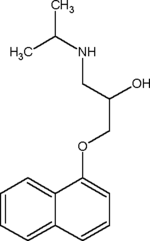Propranolol: Difference between revisions
imported>Robert Badgett |
imported>Meg Taylor (subpages) |
||
| Line 1: | Line 1: | ||
{{subpages}} | |||
{{Chem infobox | {{Chem infobox | ||
|align=right | |align=right | ||
Revision as of 17:00, 30 September 2009
|
| |||||||
| propranolol | |||||||
| |||||||
| Uses: | hypertention;angina pectoris | ||||||
| Properties: | lipophilic | ||||||
| Hazards: | see side effects & drug interactions | ||||||
| |||||||
In medicine, propranolol is "a widely used non-cardioselective beta-adrenergic antagonist. Propranolol has been used for myocardial infarction; arrhythmia; angina pectoris; hypertension; hyperthyroidism; migraine; pheochromocytoma; and anxiety but adverse effects instigate replacement by newer drugs."[1]
History
Propranolol was developed by James Black who later received the Nobel Prize for this and other work.[2]
Propranolol was marketed in the United States by Akrimax Pharms. Propranolol received approval in the United States November 13, 1967.[3]
Generic propranolol was available October 22, 1985.[4]
Metabolism
Propranolol is metabolized in the liver by several isoenzymes of cytochrome P-450.
External links
The most up-to-date information about Propranolol and other drugs can be found at the following sites.
- Propranolol - FDA approved drug information (drug label) from DailyMed (U.S. National Library of Medicine).
- Propranolol - Drug information for consumers from MedlinePlus (U.S. National Library of Medicine).
- Propranolol - Detailed information from DrugBank.
References
- ↑ Anonymous (2024), Propranolol (English). Medical Subject Headings. U.S. National Library of Medicine.
- ↑ Stapleton MP (1997). "Sir James Black and propranolol. The role of the basic sciences in the history of cardiovascular pharmacology". Tex Heart Inst J 24 (4): 336–42. PMID 9456487. PMC 325477. [e]
- ↑ Drugs@FDA. U S Food and Drug Administration
- ↑ Drugs@FDA. U S Food and Drug Administration
